1 day ago Loki A Subtle Detail Shows Timelines Can Do More Than Diverge Much of Loki revolved around the variations that can occur, but it only hints at one possibility timelines don't just diverge, they converge too WARNING The following contains spoilers for Loki Episode 6, "For All Time Always," streaming now on DisneyExplain 1/71/281/1121/448 A) It converges;Would really appreciate if the complete code is provided thank you so much 5 Comments Show Hide 4 older comments Walter Roberson on
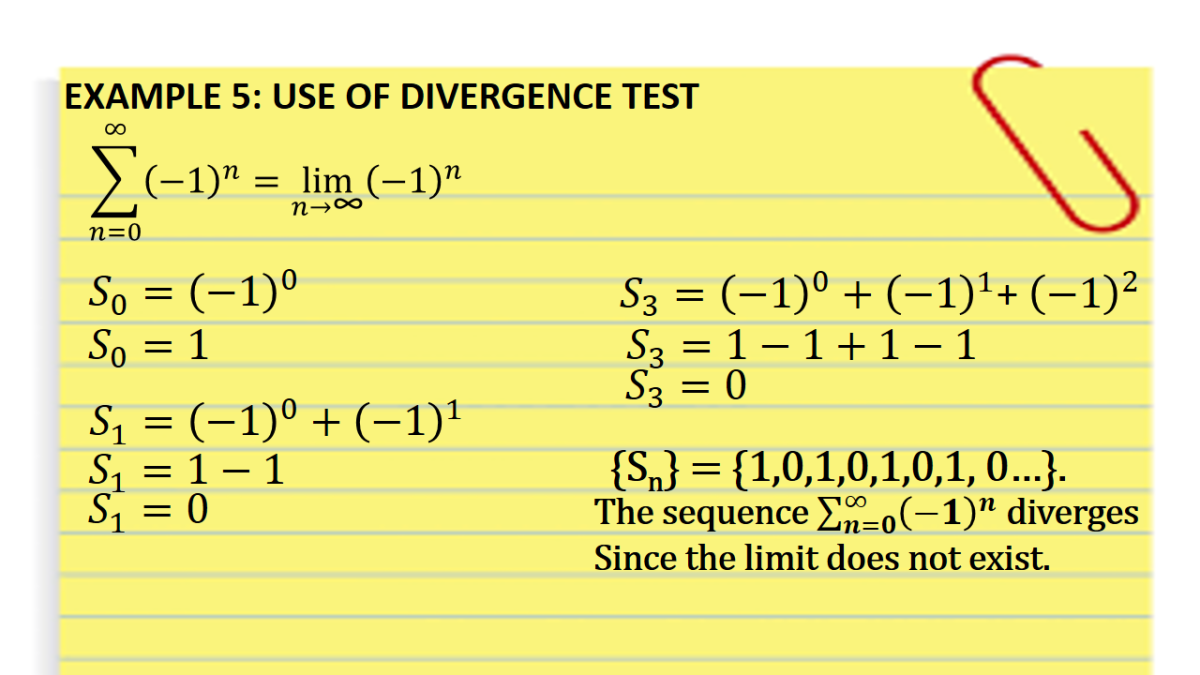
Divergence Test Determining If A Series Converges Or Diverges Owlcation
Cos(1/n)/n^2 converge or diverge
Cos(1/n)/n^2 converge or diverge-A (n) = 2^ (n)/n! sum_(n=1)^oo (1)^n n^2/(n^21) does not converge This is an alternating series, so the necessary condition for it to converge is that lim a_n = 0 a_(n1)/a_n < 1 As a_n = n^2/(n^21) we have lim_n a_n = lim_n n^2/(n^21) = 1 Therefore the series does not converge




Determine Whether The Series Sum N 1 Infty 1 N 1 Frac 1 N N 2 Converges Absolutely Or Converges Conditionally Or Diverges Mathematics Stack Exchange
If r < 1, then the series is absolutely convergent If r > 1, then the series diverges If r = 1, the ratio test is inconclusive, and the series may converge or diverge Root test or nth root test Suppose that the terms of the sequence in question are nonnegative Define r as followsAt which point we can cancel the n!See the answer Show transcribed image text Expert Answer 100% (1 rating) Previous question Next question Transcribed Image Text from this Question
Step 1 Plain text notation lesson sum 1,infty 4 (1/2)^ (n1) would be interpreted as 2 Convergence A geometric series converges if the common ratio is in the interval Since , this series converges The sum of a convergent geometric series of the form is given by The rest is just arithmeticIt has a sum B) It converges;Does it converge or diverge?
N is divergent then the radius of convergence of P 1 n=1 a nx n is 1/3 FALSE a n = 1 22 If c 2R is some constant then the radius of convergence of P 1 n=1 ca nx n is the same as the radius of convergence of P 1 n=1 a nx n TRUE 23 If P(x) is some polynomial then P 1 n=1 P(n)xn has radius of convergence 1 TRUE 2If you meant the sequence (n1)/n when the question, not series, the sequence converges, but if you actually meant the series ∑ (n1)/n, then it diverges Sequence The sequence whose n t h term is ( n 1) / n is the list 2 1, 3 2, 4 3, 5 4, The terms of this sequence approach 1 It's a convergent sequence whose limit is 1Explain your answer Answer For large n, the n2 should dominate the p
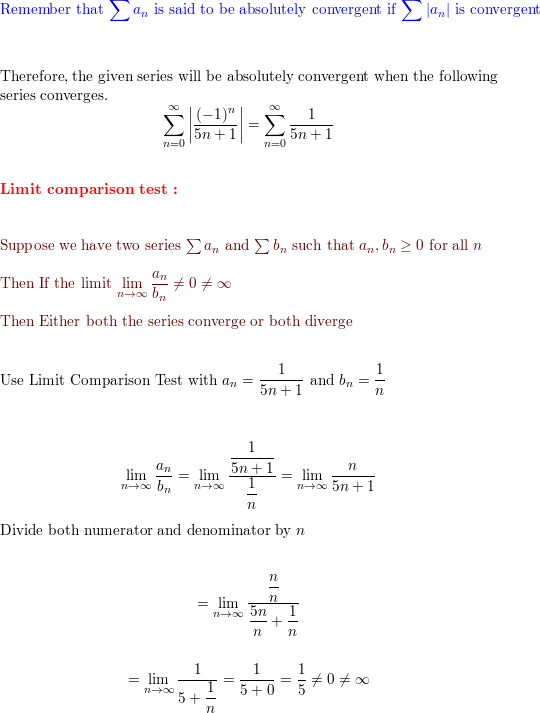



I Don T Understand This Explanation For Sum N 0 Infty 1 N 5n 1 Why Test For Convergence Divergence Again If The Limit Comparison Test Confirms That Both Series Are The Same Socratic
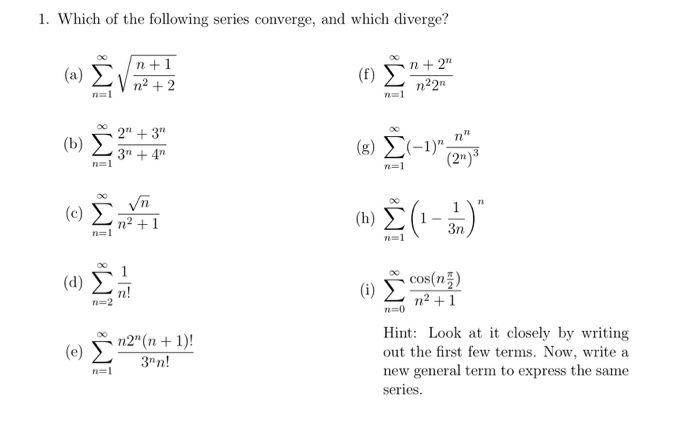



1 Which Of The Following Series Converge And Which Chegg Com
This sum divergeswe can say this by using the pseries theorem eg we have a series summation (n^p) where n goes from 1 to infinity then if p>1 then the series converges and if pThen the answer is yes, as matha_n = \dfrac{n}{2n^2–1} = \df Something went wrong Wait a moment and try againComparing Converging and Diverging Sequences Every infinite sequence is either convergent or divergent A convergent sequence has a limit — that is, it approaches a real number A divergent sequence doesn't have a limit Thus, this sequence converges to 0 In many cases, however, a sequence diverges — that is, it fails to approach any



Www Ualberta Ca Rjia Math314 Hwks Prob4 Pdf
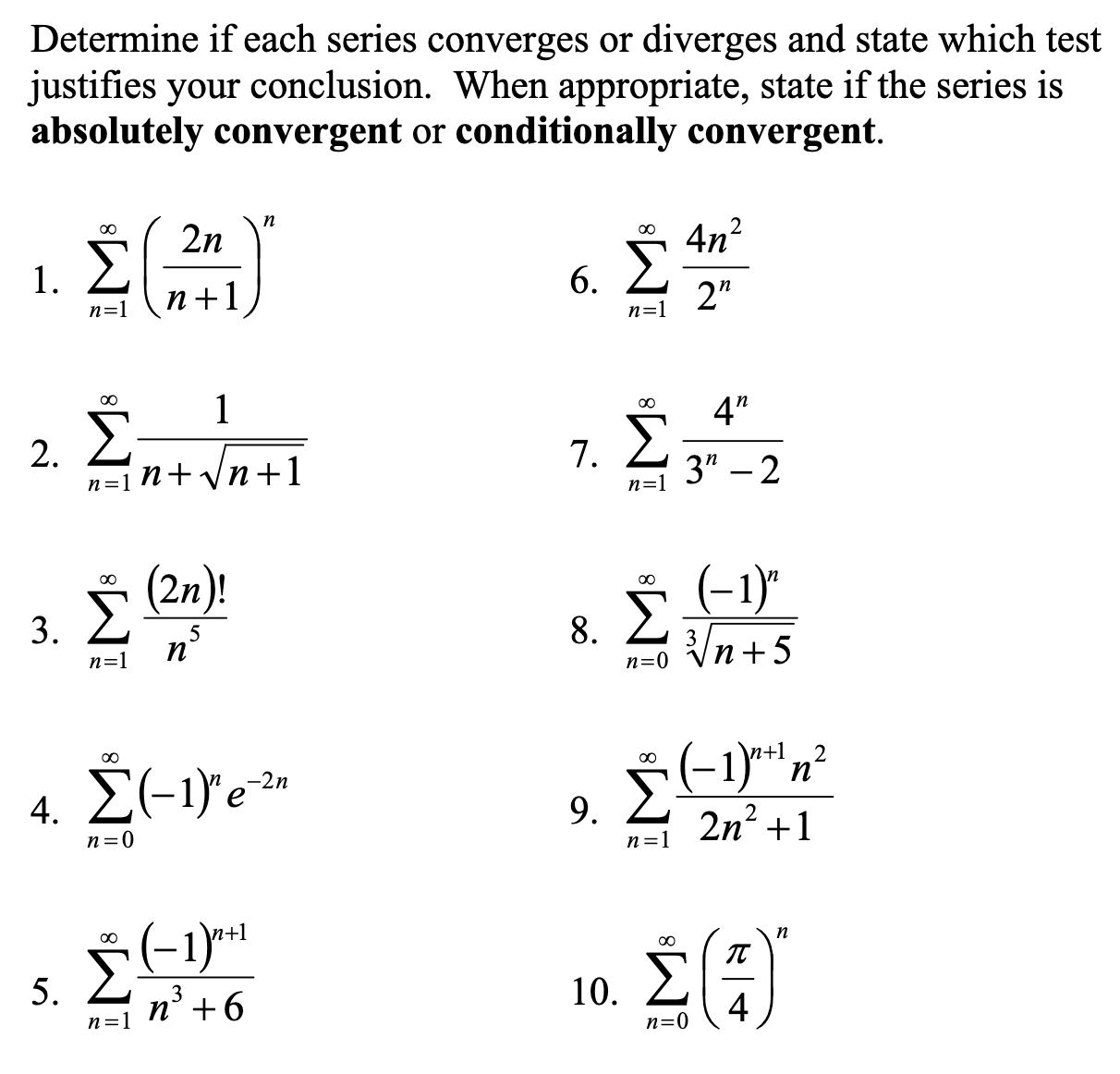



Answered Determine If Each Series Converges Or Bartleby
If we ask * Does the sequence matha_n =n/(2n^2–1)/math converge when mathn\to\infty/math?Question An = N (1)^n1/n^2 1 Converge Or Diverge This problem has been solved!N=4 3 also diverges 2 P 1 n=1 1 2 converges, so P 1 n=1 1 n22 converges Answer Let a n = 1=(n2 2) Since n 2 2 >n2, we have 1=(n 2)




Sigma 1 Infinity 2 N 1 3 N Determine Whether The Series Converges Or Diverges Youtube
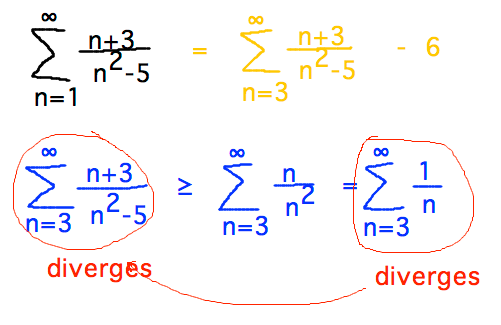



Geneseo Math 222 01 Absolute Convergence
Answer to Evaluate the following as yes or no The series Sigma_{n = 1}^infinity {(2)^{n 2}} / {(n 2)^{n 1}} diverges By signing up,=1 2 1 n n n Pick 2 1 n b n = (pseries) 2 2 1 1 n a n ≤ = , and ∑ ∞ =1 2 1 n n converges, so by (i), ∑ ∞ =1 2 1 n n n converges Some series will "obviously" not converge—recognizing these can save you a lot of time and guesswork Test for Divergence If lim ≠0 → ∞ n n a, then ∑ ∞ nYou can put this solution on YOUR website!




Divergence Test Determining If A Series Converges Or Diverges Owlcation
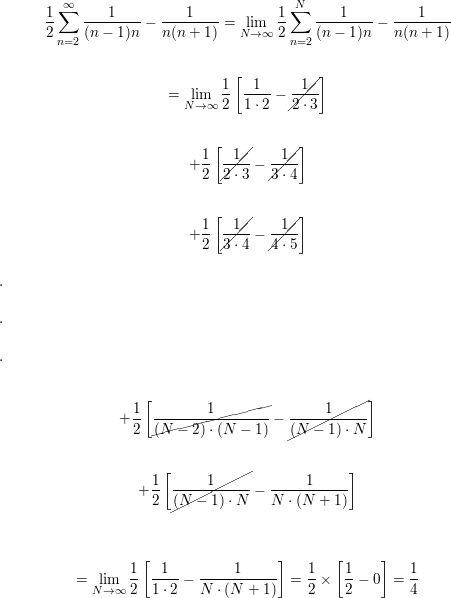



Determine Whether The Series Is Convergent Or Divergent By Expressing Sn As A Telescoping Sum If It Is Convergent Find Its Sum Ergent Or Divergent If It Is Convergent Find The Sum
Homework Equations The Attempt at a Solution By the Cauchy condensation test In the line above, you aren't using the condensation test correctly For your series, f(n) = n/(2 n), so what would be f(2 n)?Nth term of the series does not approach zero therefore the series diverges, specifically to ¡1 Hence, x ˘ 0 cannot be included in the interval of convergence For x ˘ 2, f (2) ˘ X1 n˘1 (¡1)n¡1n, which diverges because the nth term of the series does not approach zero Hence, x ˘ 2 cannot be included in the interval of convergence either Therefore, the interval of convergence is 0 ˙x ˙2,Similarly, the sum of 31/2^n equals the sum of 3 the sum of 1/2^n Since the sum of 3 diverges, and the sum of 1/2^ n converges, the series diverges You have to be careful here, though if you get a sum of two diverging series, occasionally they will cancel each other out and the result will converge



Determine Whether The Sequence Ln 2n 2 1 Ln N 2 1 Converges Or Diverges If The Sequence Brainly Com
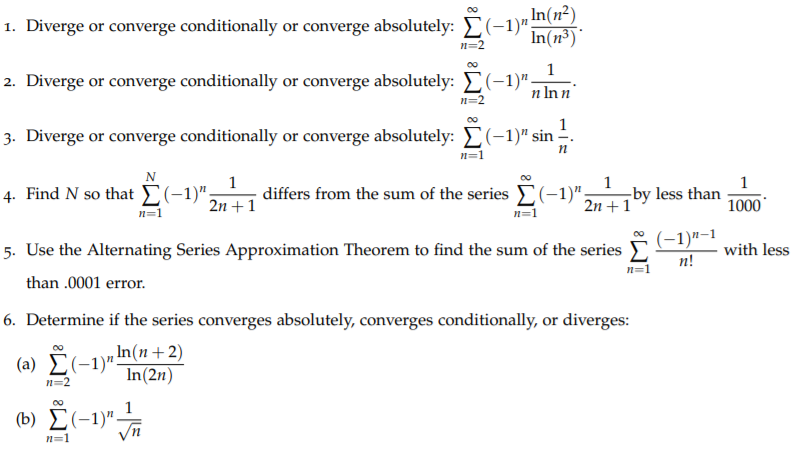



In N2 1 Diverge Or Converge Conditionally Or Chegg Com
Sum( (1)^n (n 1)/n, n = 1, 2, )Please Subscribe here, thank you!!! So, to determine if the series is convergent we will first need to see if the sequence of partial sums, { n ( n 1) 2 } ∞ n = 1 { n ( n 1) 2 } n = 1 ∞ is convergent or divergent That's not terribly difficult in this case The limit of the sequence terms is, lim n → ∞ n ( n 1) 2 = ∞ lim n → ∞ n ( n 1) 2 = ∞N2 1 1 n=1 converge or diverge?
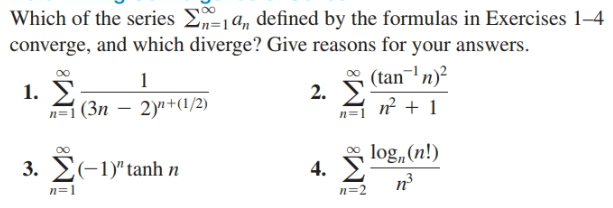



Answered Which Of The Series Ea Defined By The Bartleby




Determine If The Series Convergence Or Divergence And State The Test Used 1 Sigma On Top Infinity When N 1 5 2n 1 2 Sigma On Top Infinity When N 1 2 4 6 2n N Homeworklib
What we're going to do now is start to explore a series of tests to determine whether a series will converge or diverge and the first one I'm going to go through right now is perhaps the most basic and we'll hopefully see the most intuitive and this is the divergence test and the divergence test won't tell us if a series will converge but it can tell us if something will definitely diverge soConverge Or Diverge Review In mathematics, a series is a sum of the terms of a sequence The sum of a finite sequence of real numbers can be expressed as a single real number The idea of a series was developed by the ancient Greek mathematiciansHence by the Integral Test sum 1/sqrt(n) diverges Hence, you cannot tell from the calculator whether it converges or diverges sum 1/n and the integral test gives lim int 1/x dx = lim log x = infinity




9 3 Integral Test And P Series P Series Test Converges If Diverges If We Could Show This With The Integral Test Ppt Download




Divergence Test Determining If A Series Converges Or Diverges Owlcation
It has a sum C) It diverges; Where does this infinite series converge Sigma (k = 1 to infinity) 1/(9k^2 3k 2) Math Does the following infinite geometric series diverge or converge?The given sequence (n1) = {2^ (n)/2^ (n1)} { (n1)!/n!} = (n1)/2 Therefore, lim (n→∞) { (n1)} = lim { (n2)/2} → ∞ > 1 Hence, by ratio test sequence converges and as ;




9 3 Integral Test And P Series P Series Test Converges If Diverges If We Could Show This With The Integral Test Ppt Download
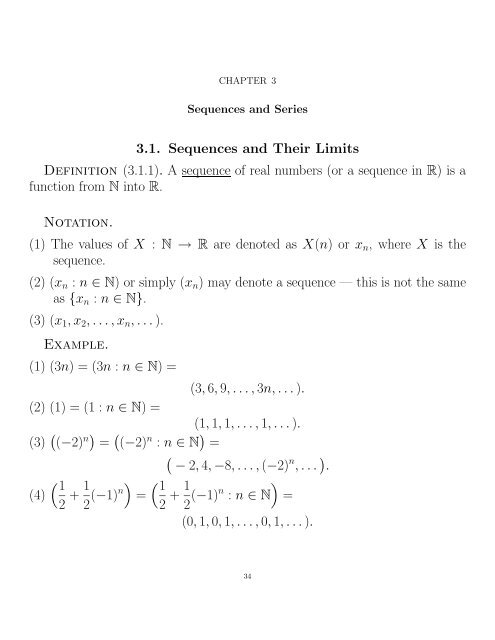



Chapter 3 Cbu
Answer The Alternating Series Test will say that the series converges provided we can show that (i) lim n→∞ n 1n2 = 0 and (ii) the sequence of terms 1n2If it diverges, explain why Answer First, notice that lim n!1 n2 n2 1 = 1 Therefore, the term inside the arctangent is going to 1, so lim n!1 arctan n2 n2 1 = arctan(1) = ˇ 4 12Does the series X1 n=2 1 n2 p n converge or diverge? I found that n^ (n2)/n^n was convergent since it was like 1/n^2 which is a p series where p>1 Therefore by the comparison theorem, the original series is convergent I'm hoping this is the right answer, but I thought it was too easy for what was deemed a
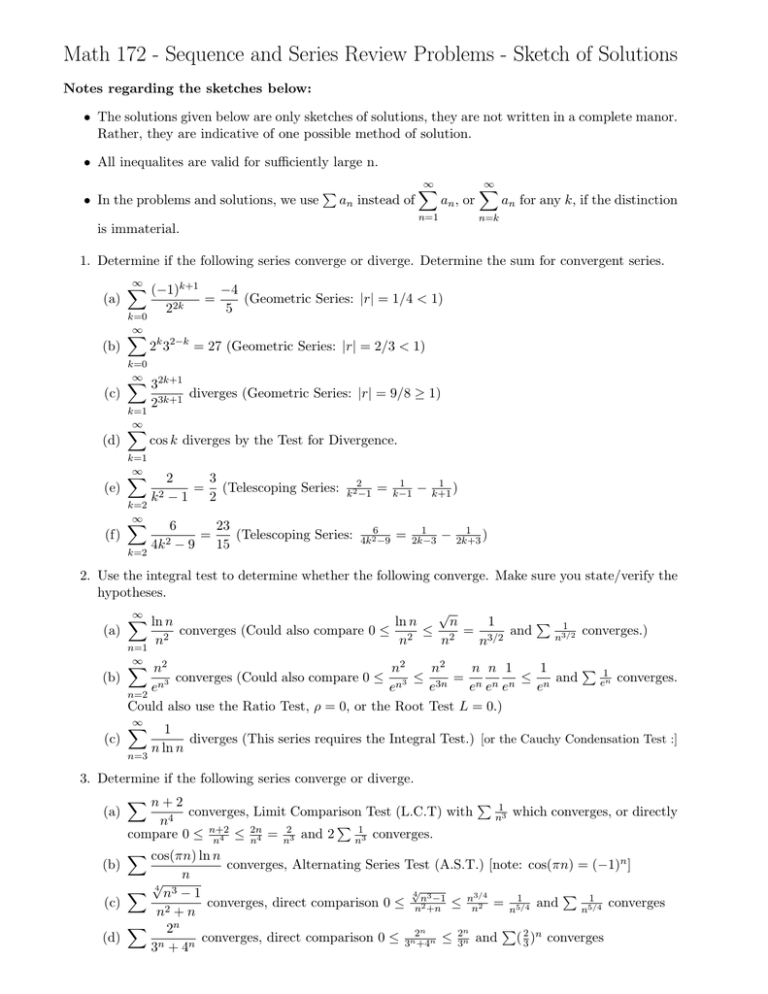



Math 172 Sequence And Series Review Problems Sketch




Pdf Tests For Convergence Of Series Nuratikah Norman Academia Edu
hello, i'm new with matlab i want to solve this equation by using matlab is it converge or diverge?Question 1 Let a n = 1 1 nn2 Does the series P 1 =1 a n converge or diverge?If it converges, nd the limit;
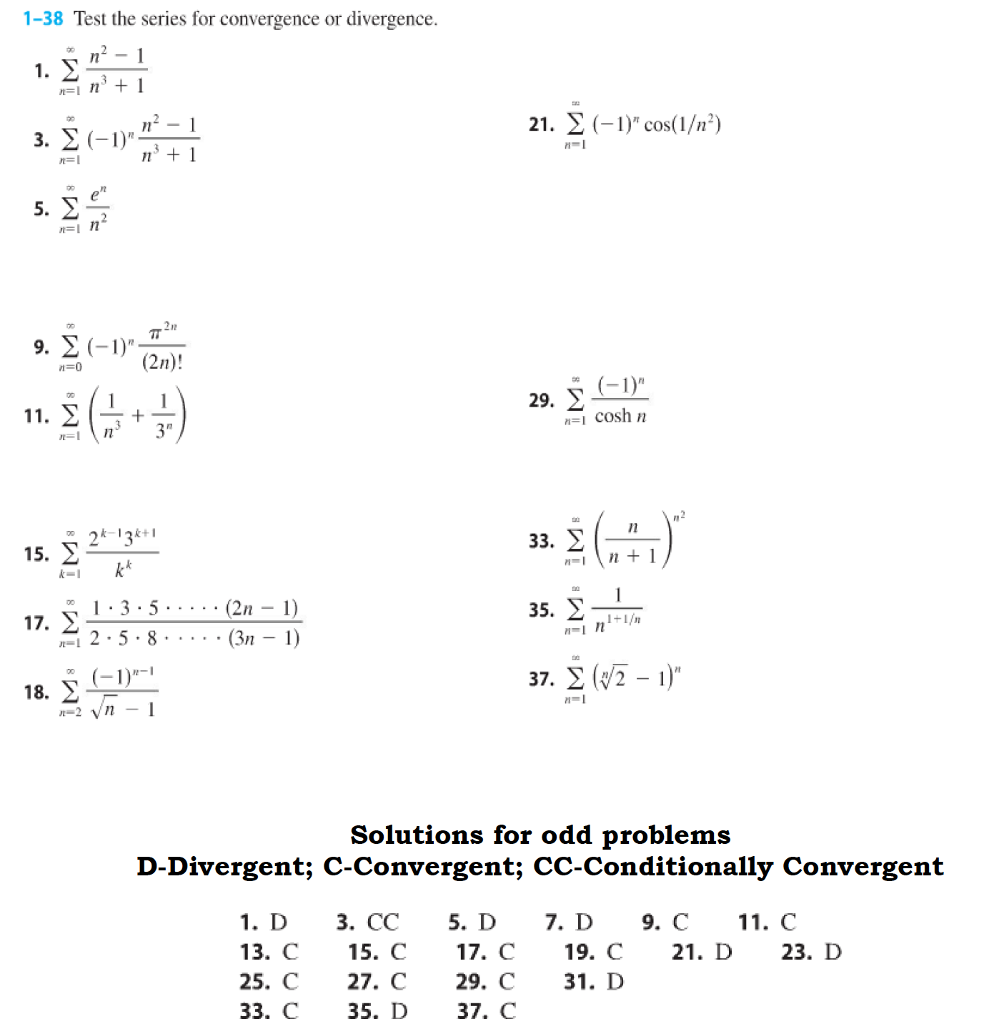



Test The Series For Convergence Or Divergence Chegg Com
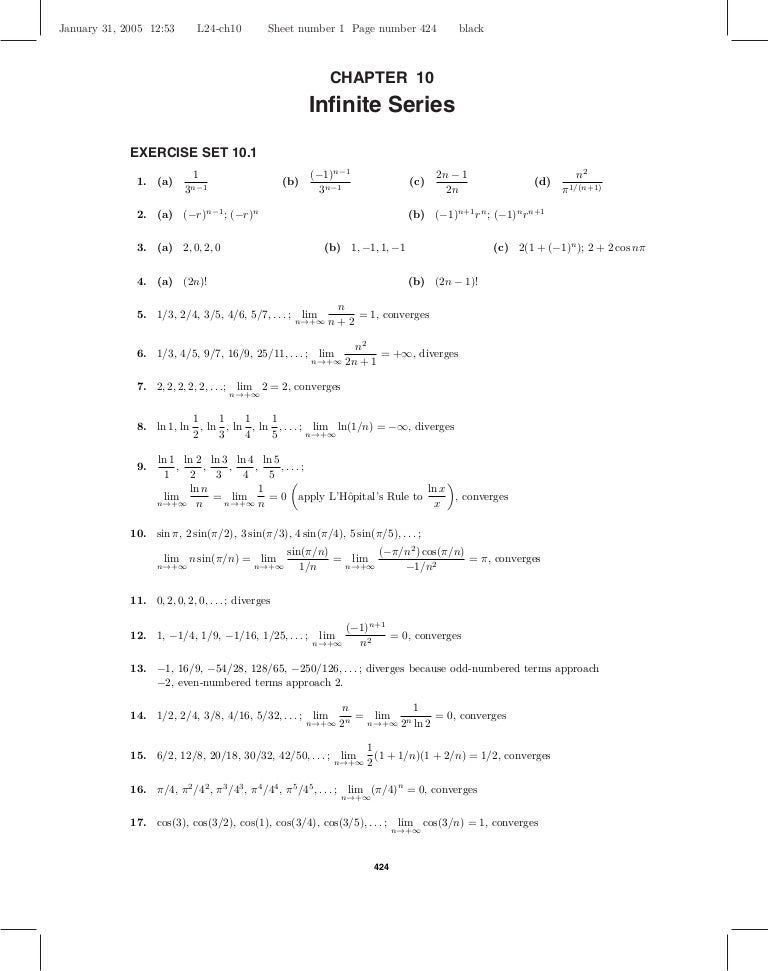



Chapter 10
Check whether the following series converge or diverge In each case, justify your answer by either computing the sum or by by showing which convergence test you are using, why and how it applies (depending on the case) (a) ∞ X n =1 n (n 2 1) DIVERGES – integral or limit comparison test (compare to ∑ ∞ n =1 1 n)Explain 1/5 1/25 1/125 1/625 A) It diverges;{n^2 * e^n} Determine whether the sequence converges or diverges If it converges, find the limit




An 1 N N 3 N 3 2n 2 1 Determine Whether The Sequence Converges Or Diverges Youtube




Understanding The Proof That The Series Sum Frac 1 N 2 Is Convergent Mathematics Stack Exchange
It does not have a sum C) It diverges; Why the sequence cos (n) diverges We are in the sequences section of our Freshman calculus class One of the homework problems was to find whether the sequence converged or diverged This sequence diverges, but it isn't easy for a freshman to see I'll discuss this problem and how one might go about explaining it to a motivated studentVideo Transcript we can use the limit Racial fast Yeah, but then we need community and goes to infinity I'm the eye and risk want I and I understand from




Limit Comparison Test For Series 1 N 2 Log N Converge Or Diverge Mathematics Stack Exchange



1
`a_n = (1(1)^n)/n^2` Determine the convergence or divergence of the sequence with the given n'th term If the sequence converges, find its limit 1 Educator answer Does this series converge or diverge?If it converges, find its value (if possible) 1 X∞ n=2 1 n− √ n The terms of the sum go to zero It looks similar to P 1 n, which diverges We also note that the terms of the sum are positive We compare them lim n→∞ 1 n− √ n 1 n = lim n→∞ n n − √ = lim n→∞ 1 1 √1 = 1 The series diverges by the limit comparison test, with




Sigma 1 Infinity N 5 N 7 N 2 1 3 Determine Whether The Series Converges Or Diverges Youtube



What Is The Convergence Of The Series 1 3 N Quora
Calculus Derivatives Derivative Applications Limits Integrals Integral Applications Integral Approximation Series ODE Multivariable Calculus Laplace Transform Taylor/Maclaurin Series Fourier Series Functions Line Equations Functions Arithmetic & Comp Conic Sections TransformationA test that would be simpler to apply would be the Limit Ratio Test utleysthrow said Thank you forAn = N (1)^n1/n^2 1 Converge Or Diverge;



Teachingcenter Ufl Edu Files Exam 2 Review Problems Mac 2312 Pdf




Determine Whether The Series Sum N 1 Infty 1 N 1 Frac 1 N N 2 Converges Absolutely Or Converges Conditionally Or Diverges Mathematics Stack Exchange
Learning goal Students start to use convergence tests—nth term and integral test are introduced Since series are really limits of partial sums, anything we know about limits we know about series For instance, if a n n=1 ∞ ∑=A and b n b=1 ∞ ∑=B (in other words, each series' partial sums converge), then n (a n1 n2 converges, the Limit Comparison Test says that the given series also converges 3 Does the series X∞ n=1 (−1)n n 1n2 converge absolutely, converge conditionally, or diverge?This preview shows page 3 6 out of 7 pages 14 Determine whether the series converge or diverge Justify your answers and also state the test (or combination of tests) that you use A




Sigma 2 Infinity N 2 1 N 3 1 Determine Whether The Series Converges Or Diverges Youtube



Link Springer Com Content Pdf 10 1007 2f978 3 7091 6146 3 12 Pdf
It does not have a sum1 Problem1 (15 pts) Does the following sequence converge or diverge as n!1 ?Give reasons for your answer If it converges, find the limit (a) (7 pts) an ˘ sinn n Answer It converges Notice that for every n 2 N, sinn is bounded as ¡1 • sinn • 1 Hence we have ¡ 1 n • sinn n • 1 n for every n 2N Now, both ¡1 n and 1If it converges, what is the sum?



1 Use The Ratio Test To Find Which Of The Following Infinite Series Converge And Which Diverge A N3 L E 2 N 2 A Compute The Radius Of Course Hero




Examine The Behaviour Of Infinite Series Of Positive Terms 1 2 1 3 2 4 1 3 5 2 4 Brainly In
L = lim n → ∞ ( n 1) n!Say you're trying to figure out whether a series converges or diverges, but it doesn't fit any of the tests you know No worries You find a benchmark series that you know converges or diverges and then compare your new series to the known benchmark If you've got Using the integral test, how do you show whether #sum 1/(n^21)# diverges or converges from n=1 See all questions in Integral Test for Convergence of an Infinite Series Impact of this question




The Ratio Test And The Root Test Dave4math




Prove By Cauchy Test That The Sequence X N Frac Sin 1 2 Frac Sin 2 2 2 Frac Sin N 2 N Converges Mathematics Stack Exchange
Show your work ∑∞n=1−4(−12)n−1 Math Does the following infinite geometric series diverge or converge? Determine whether the series converges or diverges ∞ ∑ n = 1e1 / n n2 Immediately I always like to try the test for divergence lim n → ∞ ∞ ∑ n = 1e1 / n n2 = 0 I judge this to be true by looking at the numerator and denominator of the series The numerator will tend to 1 as n → ∞ and the denominator will grow bigger and bigger, so eventually you will have 1 ∞ whichN=1 bn and P1 n=1 an converge or diverge together 2 If L 2 R;L = 0, and P1 n=1 bn converges then P1 n=1 an converges 3 If L = 1 and P1 n=1 bn diverges then P1 n=1 an diverges Proof 1 Since L > 0, choose † > 0, such that L ¡ † > 0 There exists n0 such that 0 • L ¡ † < an bn < L¡† Use the comparison test 2 For each † > 0, there exists n0 such that 0 < an bn < †, 8 n > n0 Use the
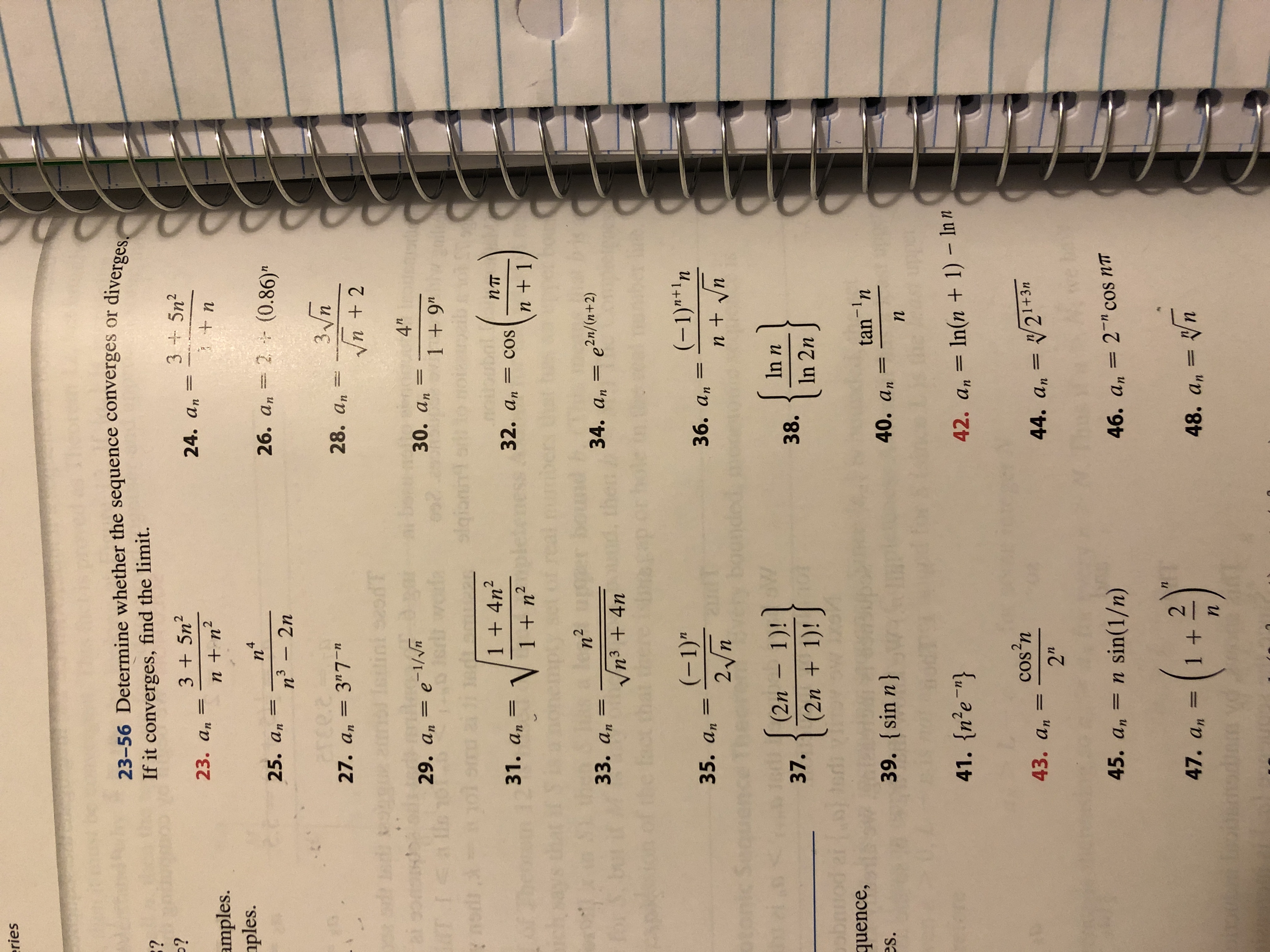



Answered Ries Diverges 23 56 Determine Whether Bartleby



Www2 Kenyon Edu Depts Math Kalaycioglu Calculus b Testsforconvergencewithanswers Pdf
Converge To approach a finite limit There are convergent limits, convergent series, sequences, and convergent improper integrals See also Convergence tests, diverge this page updated 19jul17 Mathwords Terms and Formulas from Algebra I to Calculus written, illustrated,It has a sum D) It converges;For the numerator an denominator to get, L = lim n → ∞ ( n 1) 5 = ∞ > 1 So, by the Ratio Test this series diverges Example 3 Determine if the following series is convergent or divergent ∞ ∑ n = 2 n2 (2n − 1
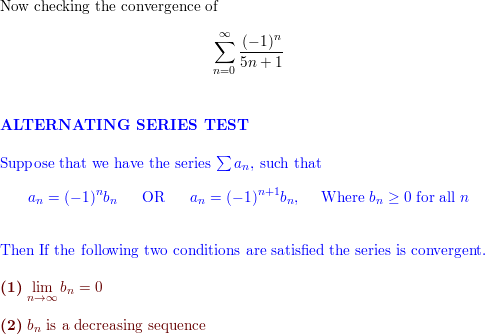



I Don T Understand This Explanation For Sum N 0 Infty 1 N 5n 1 Why Test For Convergence Divergence Again If The Limit Comparison Test Confirms That Both Series Are The Same Socratic
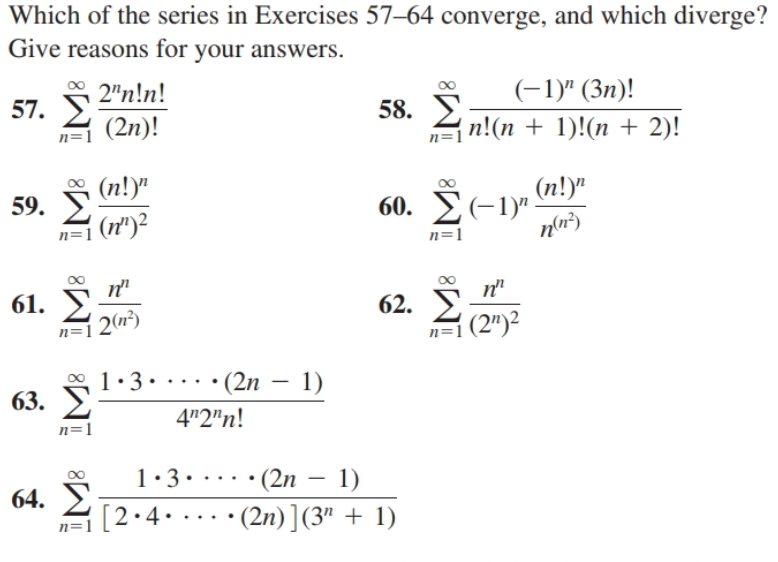



Answered Which Of The Series In Exercises 57 64 Bartleby
Prove your claim Solution This series converges Notice that for all n 1, 1nn2 >n2, so 1=(1nn2) < 1=n2, meaning that each term of this series is strictly less than 1=n2 Since P 1 n=1 1=n 2 converges, this series converges as well Question 2 Let a n= n 4 1 So yes, a sequence can only converge or diverge, because either there is a limit, or there isn't Does 1 sqrt converge?It has a sum*** B) It diverges;
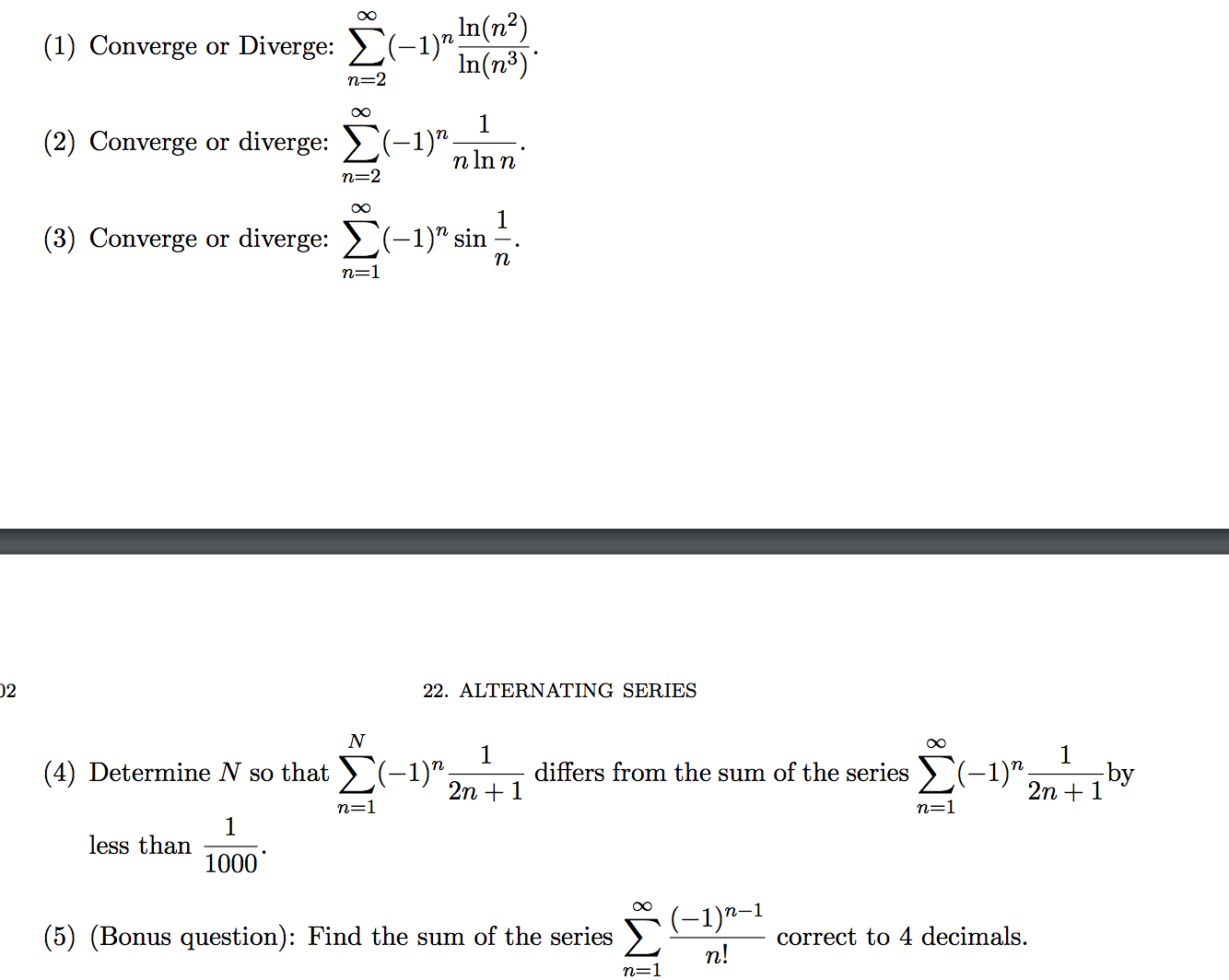



Converge Or Diverge Summation N 2 Infinity 1 N Chegg Com



Http Online Sfsu Edu Ycheung 370 Hw5solns Pdf
Infinite Series Analyzer Determines convergence or divergence of an infinite series Calculates the sum of a convergent or finite series1Check whether the following series converge or diverge In each case, justify your answer by either computing the sum or by by showing which convergence test you are using, why and how it applies (depending on the case) (a) X1 n=1 n (n2 1) DIVERGES { integral or limit comparison test (compare to P 1 n=1 n) (b) X1 n=1 ( 1)n n (n2 1) Does the series converge or diverge?




Find The Range Of X For The Convergence Of The Series Sum N 1 Infty Frac 1 Left 3 Right N 2 Frac Left 4x 12 Right N N 2 1 Mathematics Stack Exchange




Calculus Find The Radius Of Convergence For 3n Prezentaciya Onlajn
Answer to Find the series converge or diverges Explain in detail sum_{n=1}^{infinity} (1)^n n^21/n^21 By signing up, you'll get thousands of




Will Series N N 1 Converge Or Diverge As N Tends To Infinity Quora



Determine The Convergence Of The Series Sin 1 N N Stumbling Robot




Convergence Of N N 2 1 Wmv Youtube



Jdong Weebly Com Uploads 3 8 5 2 Assignment19 Pdf



Http Edshare Soton Ac Uk Id Document 5512



Link Springer Com Content Pdf 10 1007 2f978 3 7091 6146 3 12 Pdf




Does The Ratio Test Fail In Testing Frac N N 2 1 Mathematics Stack Exchange
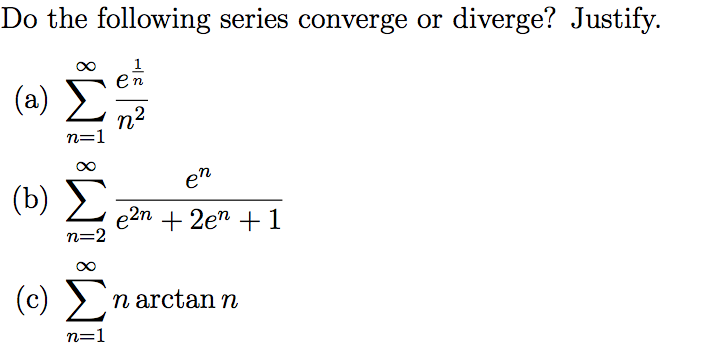



Do The Following Series Converge Or Diverge Justify Chegg Com




Lesson 69 Ratio Test Comparison Tests Ppt Video Online Download



Http Www Math Colostate Edu Clayton Teaching M115f09 Exams Exam1solutions Pdf




Exam 4 Problem 1 Find All X Such That The Infinite Series A Aˆa N



Q Tbn And9gcrg5rnlxhi9bhzev0utyguxr6rks7h 0v8ni1oftylzwmsxsyx3 Usqp Cau



1



Jdong Weebly Com Uploads 3 8 5 2 Assignment19 Pdf
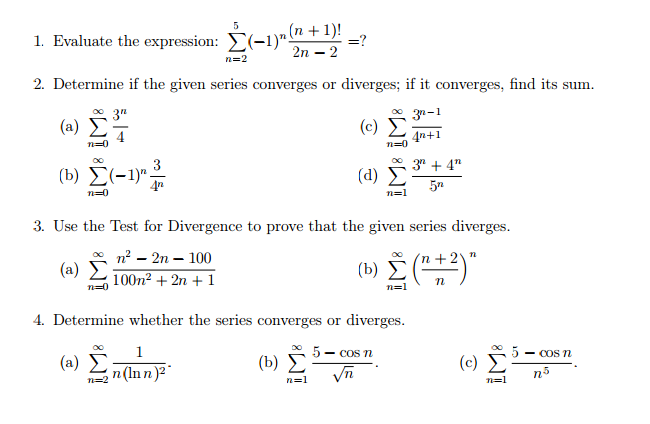



Evaluate The Expression Sigma 5 N 2 1 N N Chegg Com



Www Math Ucla Edu Josephbreen Infinite Series Problems Pdf




Does Sum 1 N 2 Converge Week 2 Lecture 11 Sequences And Series Youtube




Divergence Test Determining If A Series Converges Or Diverges Owlcation



Infinite Sequences




In Questions 1 8 Find The Limit Of The Sequence Sin N Cos N 2 37 N Sin N 3 4 Cos Rn 5 N Sin N O Cos N N 9 If
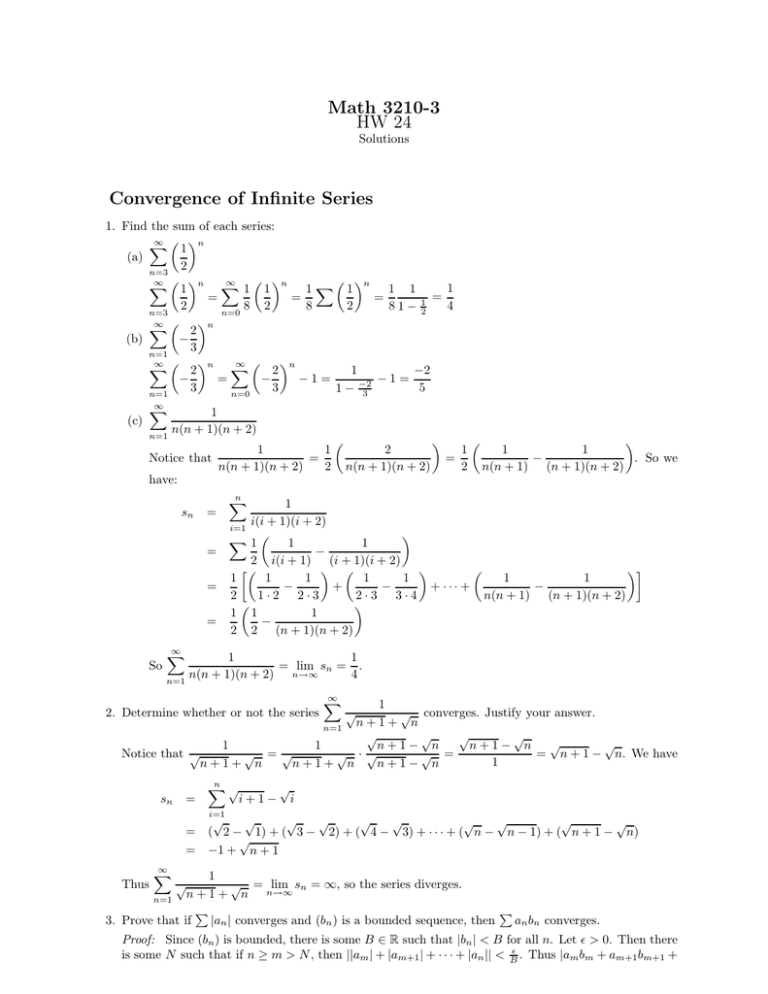



Math 3210 3 Hw 24 Convergence Of Infinite Series




Ratio Test Video Khan Academy



Chapter Viii



Http Www Webassign Net Resources Rogacalcet2 Testing Series Et Pdf



Teachingcenter Ufl Edu Files Exam 2 Review Problems Mac 2312 Pdf




Convergent Divergent Geometric Series With Manipulation Video Khan Academy



Http 1 160 97 198 8080 Xmlui Bitstream Handle 758 Chapter13 Pdf Sequence 13
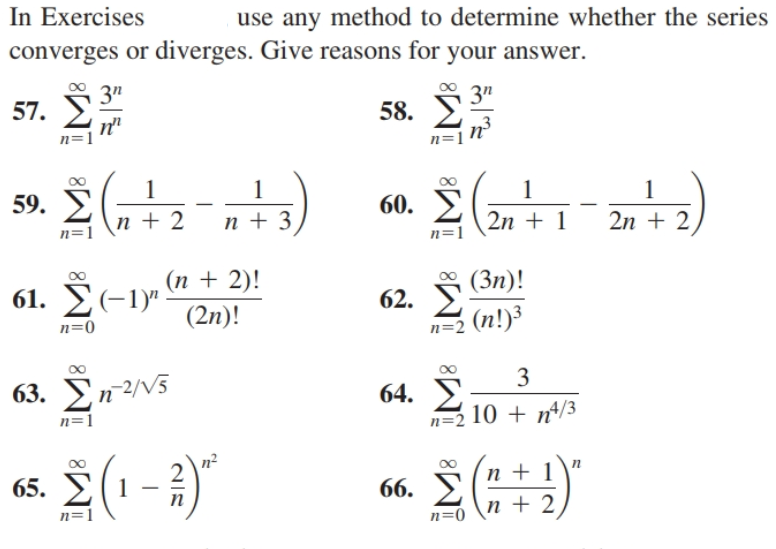



Answered In Exercises Converges Or Diverges Bartleby




Basel Problem Wikipedia
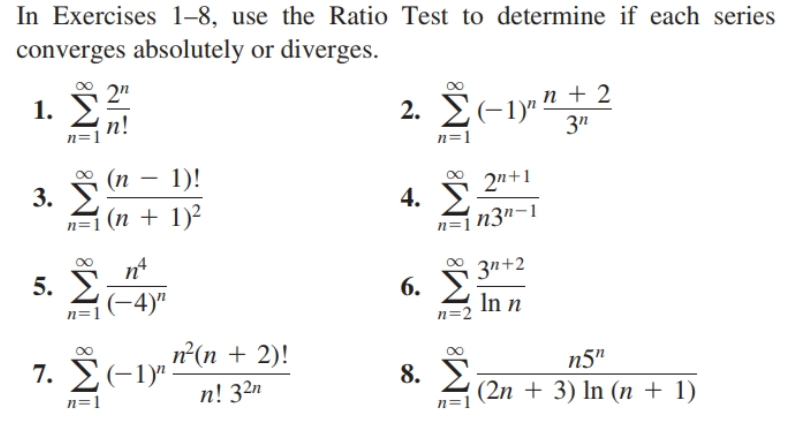



Answered In Exercises 1 8 Use The Ratio Test To Bartleby




Why Does 1 N Diverge Quora



Determine Whether The Series Is Convergent Or Divergent By Expressing Sn As A Telescoping Sum As In Brainly Com




Sigma 1 Infinity 1 N N 2 Sqrt 1 N 2 N 6 Determine Whether The Series Converges Youtube




Slides Show




Alternating Series Test Video Khan Academy
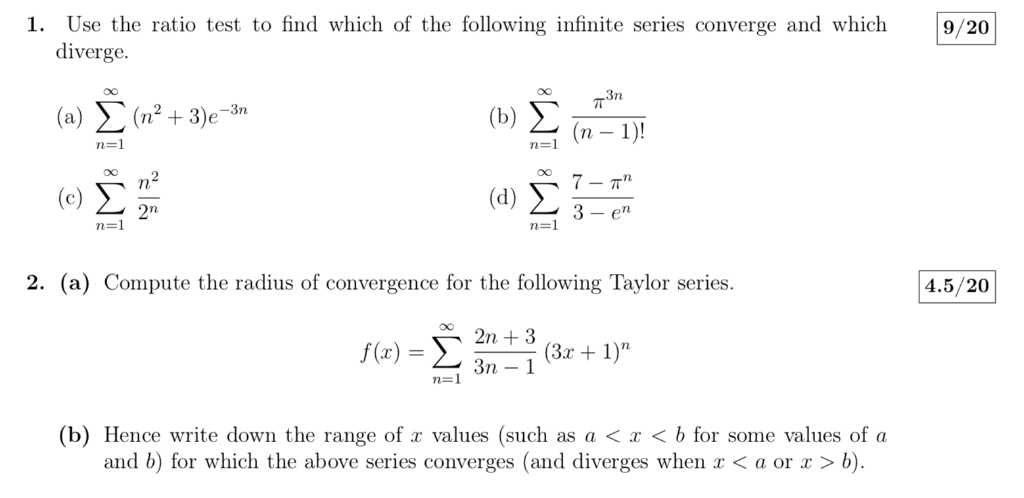



Use The Ratio Test To Find Which Of The Following Chegg Com




Calculus Find The Radius Of Convergence For 3n Online Presentation




Question Video Using The Ratio Test For Series Convergence Nagwa
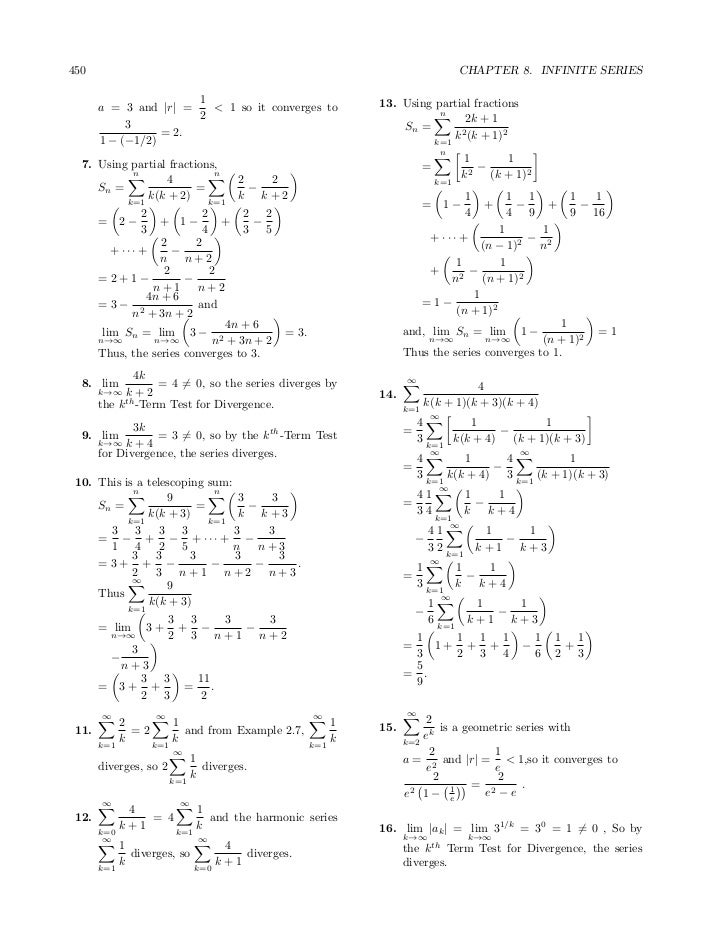



Ism Et Chapter 8
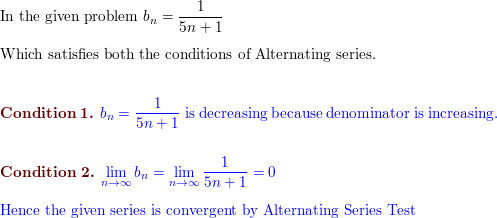



I Don T Understand This Explanation For Sum N 0 Infty 1 N 5n 1 Why Test For Convergence Divergence Again If The Limit Comparison Test Confirms That Both Series Are The Same Socratic
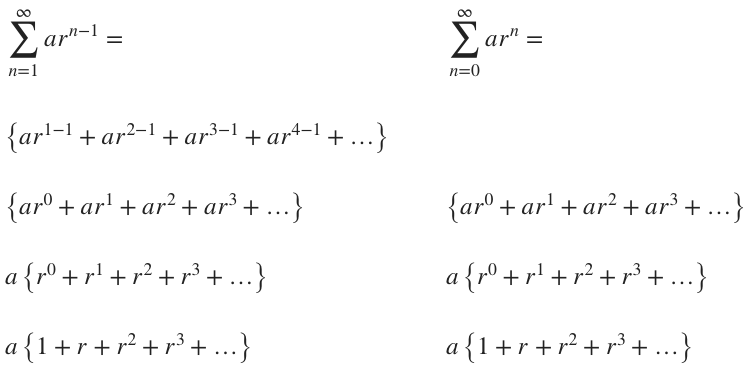



Geometric Series Test To Figure Out Convergence Krista King Math Online Math Tutor




Convergence Of Series Of The Form Sum 1 N X Mathematics Stack Exchange



Determine The Convergence Or Divergence Of F N N2 N 1 N2 1 N Stumbling Robot




How Can Math Sum N 1 Infty Frac 1 N Math Diverge But Math Sum N 1 Infty Frac 1 N 2 Math Converge Quora
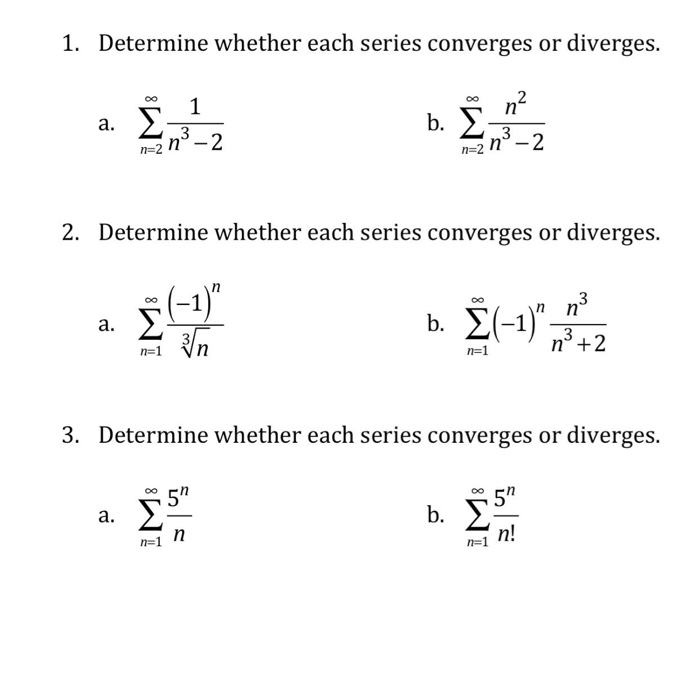



Determine Whether Each Series Converges Or Diverges Chegg Com



Www Ualberta Ca Rjia Math214 Hwks Sol2 Pdf



Teachingcenter Ufl Edu Files Exam 2 Review Problems Mac 2312 Pdf



Www3 Nd Edu Dgalvin1 S08 Exam3 Solns Pdf




Determine Whether The Following Series Converges Or Diverges Sum N Sqrt N 2 13 Series 1 Youtube
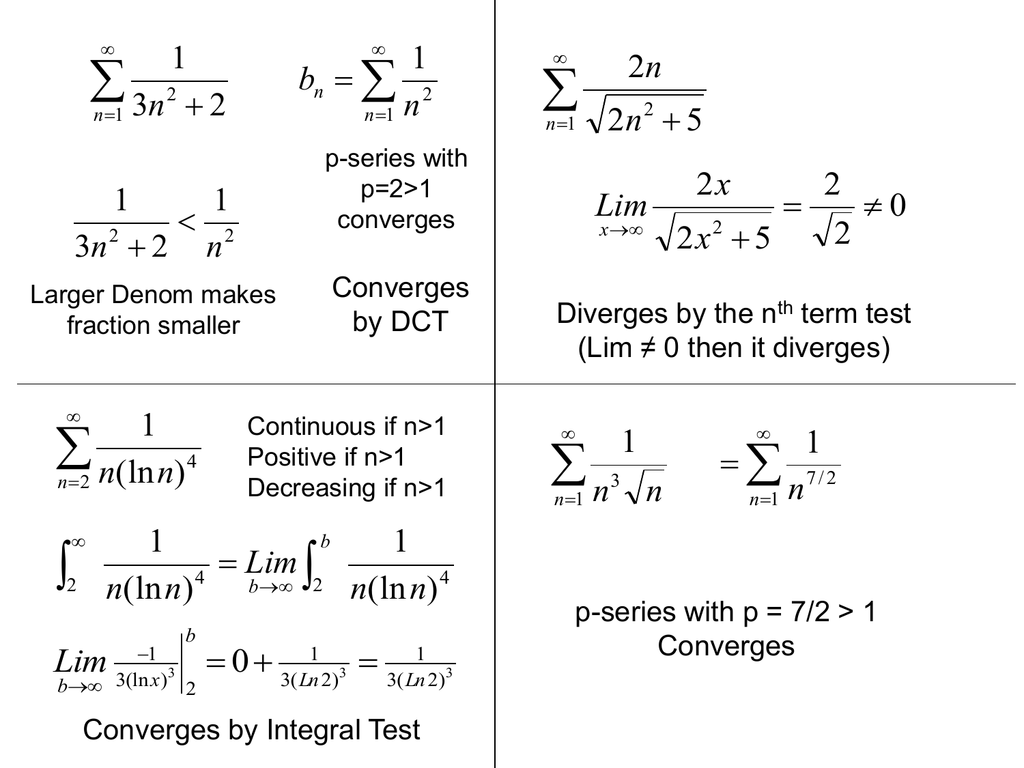



Chapter 9 5 Alternating Series Test Alternating Series Remainder



Teachingcenter Ufl Edu Files Exam 2 Review Problems Mac 2312 Pdf
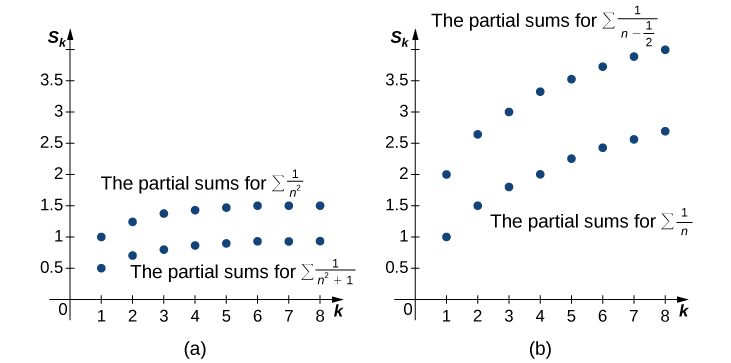



8 4 Convergence Tests Comparison Test Mathematics Libretexts



Http People Math Sc Edu Boylan Sccourses 142fa10 Quiz9 Solutions Pdf



Www3 Nd Edu Apilking Math Work Old exams Solutionsex3s18 Pdf
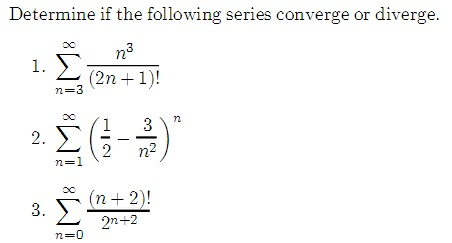



Determine If The Following Series Converge Or Chegg Com



Determine The Convergence Or Divergence Of F N 1 N N 1 1 N 2 Stumbling Robot



Http Web Iitd Ac In Sreenadh Mtl100 Infinite Series 1 Pdf



1



Users Math Msu Edu Users Gnagy Teaching 12 Spring Mth133 L31 133 Pdf
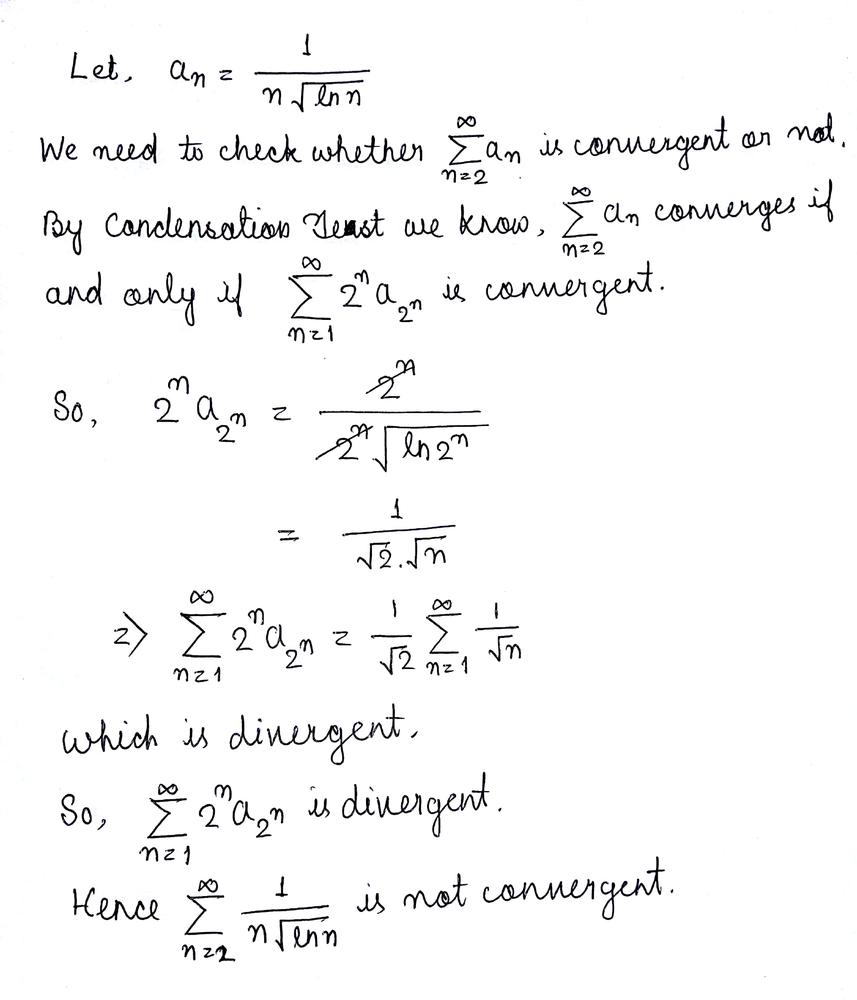



Use Any Method To Determine Whether The Series Converges Or Diverges Give Reasons For Your Answer Sum N 2 Infty Frac 1 N Sqrt Ln N Homework Help And Answers Slader




Absolute And Conditional Convergence




H W Which Of The Sequences A N Converge And Whi Gauthmath



0 件のコメント:
コメントを投稿